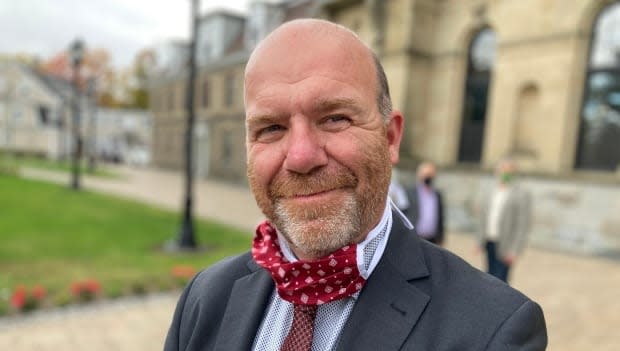MLAs take oaths, Liberals select interim leader in busy return to legislature
After a two-week post-election lull, the New Brunswick Legislature woke from its slumber Monday with the swearing-in of all 49 members of the assembly.
Lt.-Gov. Brenda Murphy administered the oath to the winning candidates in the Sept. 14 election, including 12 newcomers.
"It's exhilarating, it's surreal, it's exciting," said Margaret Johnson, the new Carleton-Victoria Progressive Conservative MLA. "We've had two weeks of celebrating and now it's time to get down to work."
New Bathurst West-Beresford Liberal René Legacy, another rookie, said it was "a bit overwhelming" to be at the legislature.
"The history of this place when you walk in for the first time is not lost on me," he said. "I won't lie: it's a bit emotional."

Premier Blaine Higgs told reporters that the legislature will start a new session with a speech from the throne around mid-November, and that he's anxious to get to work implementing his agenda.
"It's kind of a mission we've been on for a long time, about fundamental improvements to the system that have always been talked about. So I'm very committed to seeing those changes.
"We really want to be very cognizant of some of the milestones on the various projects we want to achieve, and to stay focused."
The 66-year-old premier shrugged off suggestions he might be in a hurry because he may choose to serve only one term.
"When people ask me that question, I respond by saying 'How old is Joe Biden?'" he said, referring to the 77-year-old presidential candidate. "I don't have a timeline at this stage."
Liberals choose interim leader
Liberal MLAs, their numbers reduced to just 17 in the election, met Monday morning and chose veteran Dieppe MLA Roger Melanson as the party's interim leader.
The former finance minister said it will be up to party members to sort out over the next two years whether the party should move to the left, stick to the centre or veer to the right.

Some party members, including Saint John-Rothesay Liberal MP Wayne Long, have said the previous Gallant government's big-spending ways alienated anglophone voters in southern New Brunswick who value fiscal prudence.
The party was virtually shut out of the region in this month's election.
At the same time, the party has seen some young progressive voters shift to the Green Party.
Melanson said grassroots Liberals will need to debate how the party should rebuild itself, but he urged women, LGBTQ New Brunswickers, environmentalists and young people to get involved in that discussion.
"We need their ideas and their engagement with us to be able to accomplish all of those important goals that society is looking for," he said.
Liberal leadership race
Melanson also said he hopes to see a large field of candidates run for the leadership whenever a vote is scheduled.
"We want to have a race," he said. "We want to have as many people from different walks of life that want to run for the leadership of the party, for the permanent position, to think about it."
Previous leader Kevin Vickers was acclaimed in the role in 2019 after no one chose to run against him. That meant Vickers was not forced to debate ideas and learn the ropes of campaigning before this month's election.
Asked if that had contributed to the party's defeat, Melanson said the COVID-19 pandemic had made it challenging for Vickers to get around the province and become better known in the months leading up to the campaign.


